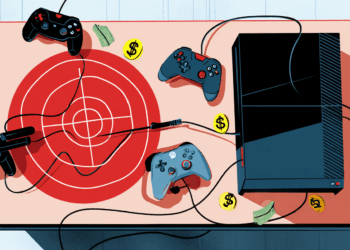“I am your retribution,” Donald Trump declared in 2023 as he campaigned to regain the presidency.
Now, with the federal criminal indictment of former FBI Director James Comey, President Trump has taken his biggest step yet toward fulfilling that pledge. In the process, he has struck a major blow to the decades-old post-Watergate norms aimed at preventing U.S. presidents from intervening in Justice Department matters.
Mr. Comey was indicted Thursday on two counts: one for making a false statement, the other for obstructing a congressional proceeding. The testimony in question was before a Senate committee in September 2020 regarding the FBI’s probe into Russian interference in the 2016 election.
Why We Wrote This
The indictment of former FBI director James Comey, which President Donald Trump demanded on social media, comes amid threats of more prosecutorial action. Critics say it could have a chilling effect across government. Mr. Trump says he is seeking justice, not revenge.
The president has long seen Mr. Comey as a nemesis, and fired him early in the first Trump term. Since then, Mr. Comey’s public criticisms of Mr. Trump engendered growing animosity, and days after a Trump loyalist was installed as U.S. attorney in the Eastern District of Virginia, the Comey indictment landed. The prior U.S. attorney, Erik Siebert, resigned under pressure from Mr. Trump over Mr. Siebert’s decision not to go forward with the Comey indictment. The new U.S. attorney, Lindsey Halligan, is a former Trump personal attorney and has no prior experience as a prosecutor.
There is “no doubt” that Mr. Trump has weaponized federal law enforcement, says Stephen Saltzburg, a law professor at George Washington University and veteran of the Reagan and first Bush Justice Departments. “What we have is a president who’s on a binge for revenge.”
Speaking to reporters on his way out of town Friday morning, Mr. Trump countered that view. “This is about justice, not about revenge,” he said when asked about the Comey indictment. It was Democrats who weaponized the Justice Department against him, he said, starting before he even came into office in 2017, investigating allegations that his campaign had colluded with Russia. “They weaponized the Justice Dept like nobody in history,” he said. “They’re corrupt.”
With leaders of his federal law enforcement and intelligence teams best known for loyalty to the president, Mr. Trump has put other figures and organizations in his sights. Former CIA Director John Brennan was widely expected to be indicted over what Mr. Trump calls the “Russia hoax,” but that investigation appears to have stalled. Former Director of National Intelligence James Clapper is also under investigation in the probe known as “Crossfire Hurricane” – the FBI investigation started during the Obama administration into alleged ties between the 2016 Trump campaign and Russia.
Last month, the home and office of Mr. Trump’s former national security adviser, John Bolton, a Trump critic, were raided by the FBI. According to news reports, the search turned up classified documents, though Mr. Bolton has yet to face legal action. New York Attorney General Letitia James, who sued Mr. Trump and his businesses for hundreds of millions of dollars, is also under investigation.
The liberal Soros Foundation, too, is facing a multi-pronged federal investigation, according to a Justice Department memo acquired by The New York Times. Mr. Trump said recently in an interview with NBC News that George Soros, the billionaire Democratic donor, should be thrown in jail and his charitable operation investigated for possible racketeering.
Mr. Trump frequently uses social media to issue apparent instructions to his team, including Attorney General Pam Bondi, eliminating any illusion that the Justice Department operates independently of the White House.
“We can’t delay any longer,” Mr. Trump posted on Truth Social last Saturday in a message directed to “Pam,” listing various figures he wants to prosecute, including Mr. Comey. “JUSTICE MUST BE SERVED, NOW!!!”
On Friday, FBI Director Kash Patel defended his agency amid charges of rampant politicization in a statement on X.
“Career FBI agents, intel analysts, and staff led the investigation into Comey and others,” Mr. Patel wrote. “They called the balls and strikes and will continue to do so. The wildly false accusations attacking this FBI for the politicization of law enforcement comes from the same bankrupt media that sold the world on Russia Gate – it’s hypocrisy on steroids. Their baseless objections tell us now, more than ever, that we are precisely over the target and will remain on mission until completion.”
Recently released declassified government documents regarding Russian interference in the 2016 U.S. election have given Trump allies new ammunition in their argument that the president was unfairly treated in what Mr. Trump calls the “Russia hoax” or “Russiagate.” Multiple investigations and reports, including one from the Republican-led Senate Intelligence Committee in 2020, have found that while Russia aggressively sought to influence the 2016 election against the Hillary Clinton campaign, there was no evidence of Russian collusion with the Trump campaign.
The Comey indictment is not without precedent. In 1978, L. Patrick Gray, former acting head of the FBI during Watergate, was charged with violating Americans’ constitutional rights over warrantless break-ins of homes. The charges were later dropped.
But today, the Comey indictment comes amid the threat of more sweeping prosecutorial action, which some political observers see as having a chilling effect across government.
At the same time, Democrats say Mr. Trump is protecting his friends, such as border security czar Tom Homan and New York Mayor Eric Adams. Last year, Mr. Homan allegedly accepted a bag containing $50,000 from undercover FBI agents in a case of suspected influence-peddling. Earlier this year, Trump Justice Department officials closed the investigation.
In New York, the U.S. Attorney’s office dropped federal corruption charges against Mayor Adams earlier this year, on orders from the Justice Department. Several prosecutors in the case resigned after being put on administrative leave.
Among the high-profile figures Mr. Trump is pursuing through legal action, the costs go beyond the threat of prison.
“It doesn’t really matter, in some ways, if you can convict a lot of these people,” says Professor Saltzburg, referring to people Mr. Trump sees as adversaries. “If you can investigate them and require them to hire lawyers, and defend against investigations, you can impose costs of hundreds of thousands of dollars on them.”
Mr. Comey, in a brief video on Instagram after his indictment, expressed both sadness and optimism.
“My heart is broken for the Department of Justice,” Mr. Comey said. “I have great confidence in the federal judicial system and I am innocent, so let’s have a trial, and keep the faith.”
Still, for the country as a whole, some political observers struggle to see a hopeful way out of the current trajectory. Chris Edelson, a political scientist at American University in Washington, sees a president acting without restraint.
“When [Mr. Trump] acts, he’s constantly seeing how far he can go, and nothing is ever enough for him,” Professor Edelson says.
“It is clear what Donald Trump intends to do,” Mr. Edelson continues. “He intends to use every mechanism available to him to punish his perceived enemies in a fundamentally undemocratic, opposed to democracy, and un-American way, the kind of thing we associate with dictatorships. And he will do it if no one stops him, if people go along with what he wants.”
Staff writer Caitlin Babcock contributed to this report.













